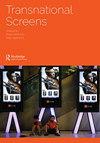Sinophone becoming in Wong Kar-wai’s in the mood for love (2000)
IF 0.4
0 FILM, RADIO, TELEVISION
引用次数: 0
Abstract
Abstract Wong Kar-Wai’s In the Mood for Love (2000) tells the story of Mr. Chow and Mrs. Chen, who, in learning that their spouses are engaged in an affair, fall in love themselves. However, in vowing to “never be like them,” Mr. Chow and Mrs. Chen abandon their affections and, by the end of the film, go their separate ways. As many have suggested, In the Mood for Love is as much a melodramatic love story as it is an allegory of Hong Kong’s precarious political situation since the British handover of Hong Kong to China in 1997. But rather than understanding the failure of their relationship in the limited sense of Wong’s representation of the difficulties ahead for Hong Kong’s political reunification with China, we argue that In the Mood for Love should be read as Wong’s portrayal of an opening to a form of life and identity that resists the narrative of Chinese essentialism often purported by the CCP. We explore this potentiality by examining how Mr. Chow and Mrs. Chen’s role-playing of their spouses’ affair, the film’s non-linear sense of time and the continual juxtaposition and confluence of East and West through dress, food, and music function as constructs of Gilles Deleuze’s crystal image. We further contend that the film’s repeated use of the crystal image suggests a Deleuzian reading of the potential processes of deterritorialization and, what we call, Sinophone becoming for both individuals and communities that constitute the Chinese diaspora.在王家卫的《花样年华》(2000)中华语的出现
本文章由计算机程序翻译,如有差异,请以英文原文为准。
求助全文
约1分钟内获得全文
求助全文
来源期刊

Transnational Screens
Arts and Humanities-Visual Arts and Performing Arts
CiteScore
0.60
自引率
0.00%
发文量
23
 求助内容:
求助内容: 应助结果提醒方式:
应助结果提醒方式:


